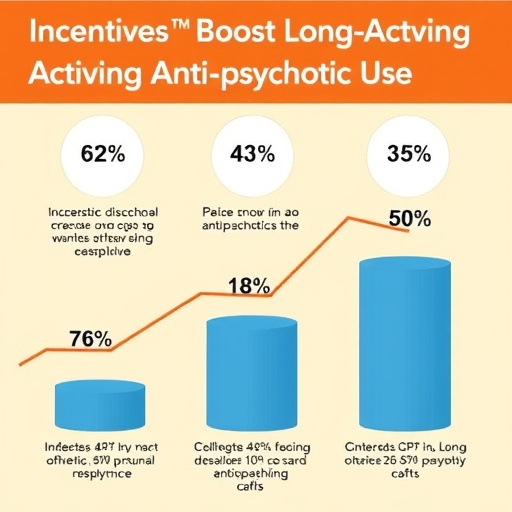In recent years, the challenge of ensuring consistent adherence to antipsychotic medication among patients with serious mental illness has remained a significant obstacle in psychiatric care. Long-acting injectable (LAI) antipsychotics have emerged as a valuable intervention to reduce relapse and hospital readmission rates, particularly for patients who struggle with daily oral medication regimens. Despite their clinical benefits, engagement with LAIs is often suboptimal, raising concerns among mental health professionals and researchers alike. A groundbreaking study published in BMC Psychiatry now sheds light on an innovative approach to enhancing adherence: the use of financial incentives.
This new research offers a nuanced exploration of community mental health professionals’ perspectives on financial incentives as a strategy to promote consistent use of LAI antipsychotics. Traditionally, financial incentives in healthcare have sparked debate around ethics and long-term effectiveness. However, this study ventures beyond mere cost-benefit analysis by integrating qualitative insights from frontline clinicians who directly administer these treatments. Their views provide critical context for understanding the practical potential and pitfalls of such schemes.
The study’s methodology involved in-depth interviews with fourteen mental health professionals specializing in LAI administration. Through a snowball recruitment process, these participants were selected for their expertise and direct patient contact. Initially, participants shared their unconditioned thoughts on financial incentives. Subsequently, they reviewed a concise presentation summarizing the latest empirical evidence demonstrating the positive impact incentives can have on engagement rates, particularly among individuals at the highest risk of relapse. This two-stage interview process allowed researchers to capture shifts in attitudes informed by evidence exposure.
Upon reflection, the researchers discovered a measurable increase in support for financial incentives, with self-reported endorsement ratings climbing from a median score of 5 out of 10 to nearly 7 after participants reviewed the empirical data. This change underscores the importance of evidence dissemination within clinical communities, suggesting that skepticism may be tempered by exposure to robust research outcomes. Practitioners began to conceptualize financial incentives not as coercion but as a form of positive reinforcement — essentially, a ‘reward’ system that could dovetail with therapeutic goals.
Importantly, the interviewed professionals connected the potential benefits of incentives to broader clinical outcomes beyond mere medication adherence. They speculated that increased engagement could foster greater patient insight into illness management, enhancing self-efficacy and therapeutic relationships. These improvements could subsequently contribute to a virtuous cycle, where patients become more active participants in their own care, potentially mitigating the repeated cycles of relapse that often characterize psychiatric disorders.
Nevertheless, the study does not shy away from detailing the complexities and ambivalence surrounding financial incentives. Several mental health professionals expressed concern about unintended consequences, chiefly the possibility that incentives might encourage superficial compliance without genuine clinical improvement. A particular worry was that some patients might misuse the funds, potentially increasing substance use or other maladaptive behaviors. These ethical quandaries highlight the need for carefully designed incentive programs that prioritize patient safety and holistic well-being.
Additionally, participants envisioned numerous implementation challenges, such as administrative burdens, resource allocation, and the delicate balance between extrinsic motivators and intrinsic motivation for treatment. They emphasized that the success of financial incentive programs depends heavily on thoughtful integration within existing clinical structures and ongoing evaluation mechanisms. Some proposed potential solutions, including tiered incentive schemes that account for individual patient needs and structured oversight to minimize risks.
Crucially, the researchers advocate for a broader dialogue among stakeholders — patients, clinicians, policymakers — to develop incentive frameworks that align with diverse preferences and cultural contexts. The study suggests that future investigations should extend beyond professional opinions to directly measure patient perspectives on receiving financial incentives for medication adherence, thus allowing for more patient-centered program design. This participatory approach could enhance acceptability, efficacy, and ethical grounding.
While previous literature has largely focused on quantitative outcomes of financial incentives, this study’s qualitative approach illuminates the lived experiences and professional judgments that often shape clinical decision-making. By making the concerns and hopes of mental health practitioners explicit, the research invites a more comprehensive consideration of how best to harness behavioral economics in psychiatric care.
The use of financial incentives to improve engaged care reflects a broader trend toward integrating behavioral intervention strategies within mental health treatment plans. As psychiatric services grapple with systemic challenges such as limited resources and high rates of treatment dropout, novel strategies that incentivize adherence offer a promising, if complex, avenue worth pursuing. This study’s findings generate an important foundation for evidence-based policy initiatives seeking to optimize therapeutic outcomes.
In conclusion, the analysis confirms that mental health professionals are not monolithic in their views on financial incentives for LAI antipsychotic adherence. While initial skepticism exists, exposure to empirical research fosters more favorable attitudes and openness to innovative approaches. This evolution signals a potential paradigm shift in managing psychotic disorders, where financial incentives could play a complementary role alongside pharmacological and psychosocial interventions.
Moving forward, it is imperative that multidisciplinary research continues to unravel the optimal design and implementation of incentive schemes, taking into account ethical, operational, and clinical dimensions. This study lights a path toward more collaborative, transparent conversations that center the well-being of patients while leveraging the insights of healthcare providers. As the mental health field embraces such integrated strategies, it holds promise for substantially improving the lives of individuals living with chronic psychiatric conditions.
Subject of Research: The acceptability and perceived utility of financial incentives by community mental health professionals to improve engagement with long-acting injectable antipsychotics in patients at risk of relapse.
Article Title: Financial incentives and long-acting injectable antipsychotics engagement: community mental health professionals’ perspectives
Article References:
Hodson, N., Majid, M., Vlaev, I. et al. Financial incentives and long-acting injectable antipsychotics engagement: community mental health professionals’ perspectives. BMC Psychiatry 25, 791 (2025). https://doi.org/10.1186/s12888-025-07165-9
Image Credits: AI Generated




